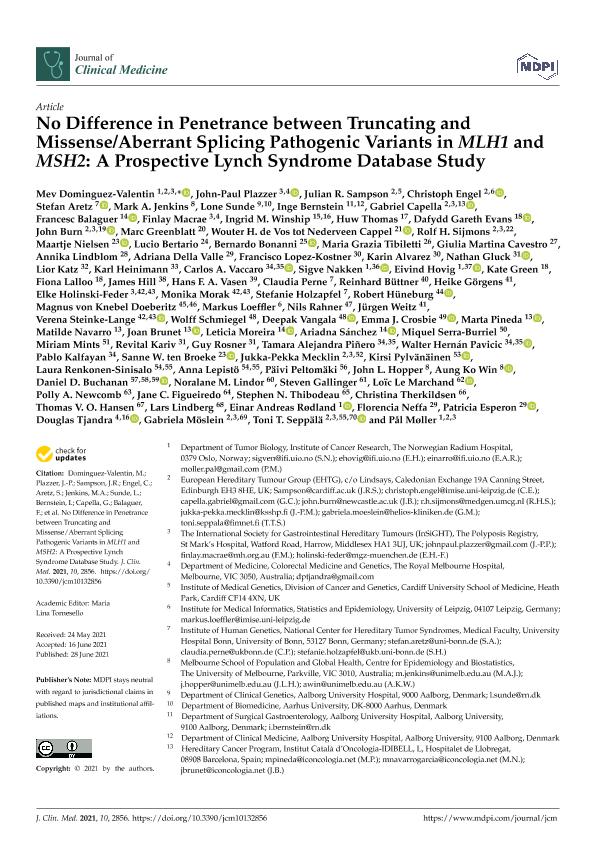Artículo
No difference in penetrance between truncating and missense/aberrant splicing pathogenic variants in mlh1 and msh2: A prospective lynch syndrome database study
Dominguez Valentin, Mev; Plazzer, John Paul; Sampson, Julian R.; Engel, Christoph; Aretz, Stefan; Jenkins, Mark A.; Sunde, Lone; Bernstein, Inge; Capella, Gabriel; Balaguer Prunés, Francesc; Macrae, Finlay; Winship, Ingrid M.; Thomas, Huw; Evans, Dafydd Gareth; Burn, John; Greenblatt, Marc; de Vos tot Nederveen Cappel, Wouter H.; Sijmons, Rolf H.; Nielsen, Maartje; Bertario, Lucio; Bonanni, Bernardo; Tibiletti, Maria Grazia; Cavestro, Giulia Martina; Lindblom, Annika; Della Valle, Adriana; Lopez Kostner, Francisco; Alvarez, Karin; Gluck, Nathan; Katz, Lior; Heinimann, Karl; Piñero, Tamara Alejandra ; Pavicic, Walter Hernan
; Pavicic, Walter Hernan
 ; Pavicic, Walter Hernan
; Pavicic, Walter Hernan
Fecha de publicación:
06/2021
Editorial:
Multidisciplinary Digital Publishing Institute
Revista:
Journal of Clinical Medicine
e-ISSN:
2077-0383
Idioma:
Inglés
Tipo de recurso:
Artículo publicado
Clasificación temática:
Resumen
Background. Lynch syndrome is the most common genetic predisposition for hereditary cancer. Carriers of pathogenic changes in mismatch repair (MMR) genes have an increased risk of developing colorectal (CRC), endometrial, ovarian, urinary tract, prostate, and other cancers, depending on which gene is malfunctioning. In Lynch syndrome, differences in cancer incidence (penetrance) according to the gene involved have led to the stratification of cancer surveillance. By contrast, any differences in penetrance determined by the type of pathogenic variant remain unknown. Objective. To determine cumulative incidences of cancer in carriers of truncating and missense or aberrant splicing pathogenic variants of the MLH1 and MSH2 genes. Methods. Carriers of pathogenic variants of MLH1 (path_MLH1) and MSH2 (path_MSH2) genes filed in the Prospective Lynch Syndrome Database (PLSD) were categorized as truncating or missense/aberrant splicing according to the InSiGHT criteria for pathogenicity. Results. Among 5199 carriers, 1045 had missense or aberrant splicing variants, and 3930 had truncating variants. Prospective observation years for the two groups were 8205 and 34,141 years, respectively, after which there were no significant differences in incidences for cancer overall or for colorectal cancer or endometrial cancers separately. Conclusion. Truncating and missense or aberrant splicing pathogenic variants were associated with similar average cumulative incidences of cancer in carriers of path MLH1 and path_MSH2.
Archivos asociados
Licencia
Identificadores
Colecciones
Articulos (IMTIB)
Articulos de INSTITUTO DE MEDICINA TRASLACIONAL E INGENIERIA BIOMEDICA
Articulos de INSTITUTO DE MEDICINA TRASLACIONAL E INGENIERIA BIOMEDICA
Citación
Dominguez Valentin, Mev; Plazzer, John Paul; Sampson, Julian R.; Engel, Christoph; Aretz, Stefan; et al.; No difference in penetrance between truncating and missense/aberrant splicing pathogenic variants in mlh1 and msh2: A prospective lynch syndrome database study; Multidisciplinary Digital Publishing Institute; Journal of Clinical Medicine; 10; 13; 6-2021; 1-12
Compartir
Altmétricas



